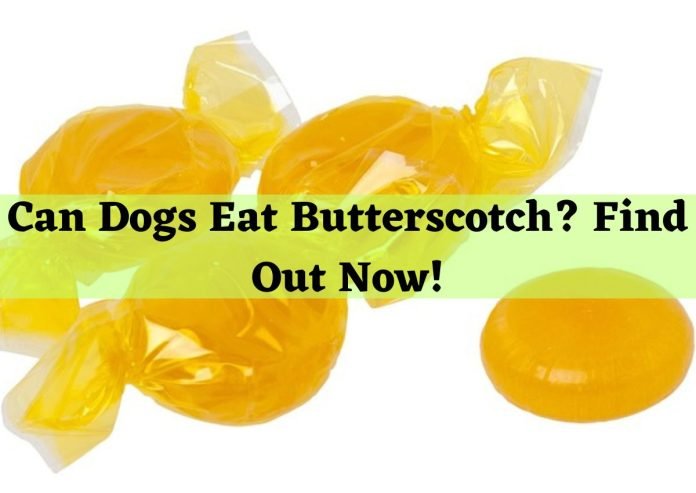
Can Dogs Eat Butterscotch? To answer that question, we first need to look at what butterscotch is made of. Butterscotch typically contains sugar, butter, and sometimes cream. These main ingredients create a sweet treat that many people enjoy, but they can be harmful to dogs.
The high sugar content in butterscotch can be dangerous for dogs, especially in large amounts. Additionally, the butter and cream add a significant amount of fat, which can lead to digestive challenges. Some varieties may even include artificial flavors or salt, both of which can be toxic for dogs. It’s important to understand these factors before considering any human treats for your furry friend. Let’s explore that- Can Dogs Eat Butterscotch?
Can Dogs Digest Butterscotch? Understanding Their Tolerance
When it comes to butterscotch, it’s essential to understand that dogs have different digestive systems and tolerances compared to humans. Here’s a closer look at how butterscotch affects dogs and why it’s best to keep it away from them.
Sugar Digestion Issues
- Processing Differences: Dogs lack certain enzymes needed to break down sugar effectively, making it difficult for them to process sugary treats. This can lead to a range of health issues, including:
- Weight Gain: Excess sugar can contribute to obesity, which is a significant concern for many dogs.
- Diabetes: Over time, regular consumption of sugary foods can increase the risk of diabetes, a serious condition that requires ongoing management.
Fat Sensitivity
Strain on the Pancreas: Butterscotch is high in fat due to its buttery ingredients, which can be problematic for dogs.
- Digestive Discomfort: Consuming high-fat foods can lead to stomach upset, including vomiting or diarrhea.
- Pancreatitis Risk: Dogs that consume too much fat are at risk of developing pancreatitis, a painful and potentially life-threatening condition that requires veterinary care.
Lactose Intolerance
- Butter and Cream Concerns: Many dogs are lactose intolerant, meaning they struggle to digest lactose found in dairy products like butter and cream.
- Digestive Upset: Consumption of these ingredients can lead to gas, bloating, diarrhea, and other gastrointestinal issues.
Risk of Additives
- Artificial Ingredients: Butterscotch may contain various additives, including:
- Artificial Sweeteners: Ingredients like xylitol are extremely toxic to dogs and can cause severe health issues, including liver failure.
- Flavorings and Preservatives: Other artificial flavorings can also lead to digestive upset or allergic reactions in some dogs.
Given the potential for digestive issues and the various health risks associated with its ingredients, it’s best to avoid giving your dog butterscotch. Instead, opt for safe and healthy treats that cater to their dietary needs and preferences!
Health Risks of Butterscotch for Dogs
Butterscotch may seem like a sweet treat, but it poses several health risks for dogs. Understanding these risks is essential for keeping your furry friend safe and healthy. Here’s a breakdown of the potential dangers associated with butterscotch consumption.
1. Obesity
- High Sugar and Fat Content: Butterscotch is loaded with sugar and fat, which can significantly contribute to unhealthy weight gain in dogs.
- Long-term Health Consequences: Obesity can lead to a host of problems, including joint issues, heart disease, and decreased overall health.
2. Diabetes Risk
- Elevated Blood Sugar Levels: Regular intake of sugary treats like butterscotch can cause spikes in blood sugar levels.
- Increased Diabetes Risk: Over time, this can increase the risk of developing diabetes, a chronic condition that requires careful management and can lead to serious health complications.
3. Pancreatitis
- Triggering a Painful Condition: The high fat content in butterscotch can trigger pancreatitis, an inflammation of the pancreas.
- Symptoms to Watch For: This painful condition can lead to vomiting, abdominal pain, and lethargy, requiring immediate veterinary attention.
4. Digestive Upset
- Common Symptoms: Dogs that consume butterscotch may experience digestive distress, which can manifest as:
- Diarrhea: Loose stools or frequent trips outside.
- Vomiting: Regurgitating the treat due to an upset stomach.
- Gas: Increased flatulence or bloating.
Given these health risks, it’s clear that butterscotch is not a suitable treat for dogs. To ensure your pet’s well-being, it’s best to opt for dog-safe treats that won’t jeopardize their health. Always consult with your veterinarian if you’re unsure about specific foods or treats for your dog!
Signs of Butterscotch Toxicity or Overconsumption in Dogs
If your dog has accidentally consumed butterscotch, it’s crucial to monitor for signs of toxicity or overconsumption. Here are the key symptoms to watch for:
1. Vomiting and Diarrhea
- Digestive Distress: These are common reactions due to the high sugar and fat content in butterscotch, which can irritate your dog’s stomach and intestines.
- Action: If vomiting or diarrhea occurs, keep your dog hydrated and consult your veterinarian if symptoms persist.
2. Lethargy or Weakness
- Energy Levels: A sudden drop in energy or increased tiredness may indicate a negative reaction to the ingredients in butterscotch.
- Monitoring: Keep an eye on your dog’s activity levels, and contact your vet if lethargy continues for more than a few hours.
3. Abdominal Pain
- Signs of Discomfort: Look for signs like pacing, whining, or adopting unusual postures (e.g., trying to stretch out or hunching over) that may indicate abdominal pain.
- Immediate Attention: If you notice these signs, it’s essential to seek veterinary advice, as abdominal pain can be serious.
4. Increased Thirst
- Dehydration Risk: The high sugar content can lead to dehydration, causing your dog to drink more water than usual.
- Symptoms to Watch: If your dog is drinking excessively or exhibiting signs of dehydration (like dry gums or lethargy), it’s important to consult with your vet.
Being aware of these signs can help you respond quickly if your dog eats butterscotch. If you observe any of these symptoms, especially in combination, it’s best to contact your veterinarian for guidance to ensure your dog’s safety and well-being.
Are There Any Benefits to Feeding Butterscotch to Dogs?
While butterscotch might seem tempting to share with your furry friend, it’s important to understand that it offers no real benefits for dogs. Here’s a closer look:
1. No Nutritional Value
- Lack of Essential Nutrients: Butterscotch is primarily composed of sugar and fat, offering no vitamins or minerals that contribute to a dog’s health. It lacks the nutritional benefits found in dog-friendly fruits and vegetables.
2. Possible Enjoyment Factor
- Taste Appeal: While dogs may enjoy the sweet taste of butterscotch, this enjoyment does not outweigh the potential health risks. The short-lived pleasure is not worth the long-term consequences for their health.
3. Better Alternatives Available
- Healthier Treats: There are many dog-safe treats that can provide similar satisfaction without the risks associated with butterscotch. Options like fresh fruits (e.g., apples or blueberries) or dog-specific treats are not only safer but also nutritious.
Feeding butterscotch to dogs does not offer any health benefits and poses significant risks. Opting for safer, healthier treats ensures your dog enjoys tasty snacks without compromising their health. Always prioritize your dog’s well-being by choosing appropriate alternatives!
Safe, Dog-Friendly Alternatives to Butterscotch
If you’re looking for sweet treats that are safe for your furry friend, there are plenty of delicious alternatives to butterscotch. Here are some great options that will satisfy your dog’s taste buds without the health risks:
1. Fruit Treats
- Apples (without seeds): Crisp and refreshing, apple slices are a great source of vitamins A and C. Just be sure to remove the seeds, as they can be harmful.
- Blueberries: These tiny fruits are packed with antioxidants and make for a tasty snack. Dogs often love the burst of flavor they provide!
- Banana Slices: Rich in potassium and vitamins, bananas are naturally sweet and can be a delightful treat when given in moderation.
2. Dog-Safe Peanut Butter
- Unsweetened Peanut Butter: This classic favorite can be a tasty reward for your pup. Just make sure it’s free from added sugars and xylitol, which is toxic to dogs. A spoonful can also be a great way to fill a Kong toy!
3. Pumpkin or Sweet Potato
- Pumpkin: Plain canned pumpkin (not the spiced pie filling) is high in fiber and can help with digestion. It’s also naturally sweet, making it a hit with many dogs.
- Sweet Potato: Cooked sweet potato slices are another nutritious option, offering fiber and a hint of sweetness that dogs enjoy.
4. Low-Calorie Dog Treats
- Specially Formulated Treats: Look for treats made specifically for dogs that are low in fat and sugar. Many brands offer a variety of flavors that your dog will love, without the added risks of human sweets.
Conclusion
By choosing these dog-friendly alternatives to butterscotch, you can treat your pup to something delicious and safe. Always introduce new foods gradually and in moderation to ensure your dog enjoys them without any adverse effects!




